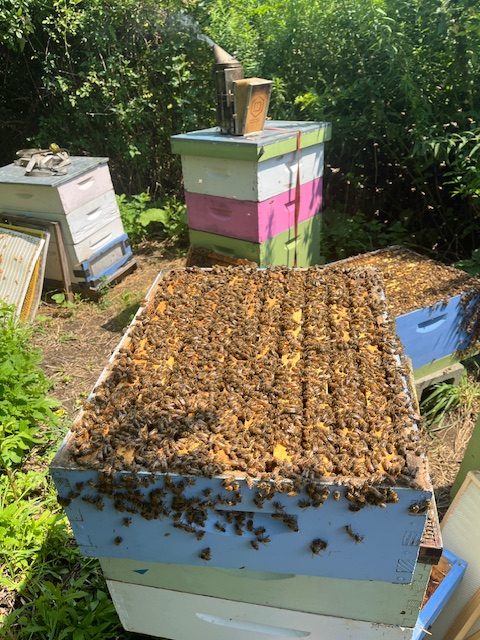
Cindy Holt, an EAS certified Master Beekeeper has always been a fan of insects. A large part of her childhood was spent checking flowers and under rocks, in hopes of finding a creature. She considered getting a degree in Entomology, but focused on raising a family. An advertisement for an annual class taught by the Rhode Island Beekeepers Association happened to pop up on her computer, which eventually led to the creation of Little Rhody Beekeeping.
“An ad for the Rhode Island Beekeepers Association’s annual class popped up as I
was writing an actual bucket list in 2011,” Holt reminisces. “I took the class, taught by Betty
Mencucci, and almost instantly was hooked.”
Holt started Little Rhody Beekeeping in 2018 with the primary purpose of taking care of bees for those that are not able to make the commitment to care for them themselves. She also sells small amounts of honey through local vendors and beeswax candles through The Veiled Crow.
“I provide the bee hives; I tend them, and I return all the honey that the person’s hive makes to them,” Holt explains of working on a customer’s hive. “I have offered mentoring in the past and I currently have one apprentice. I also am always happy to accept calls about bees and point people in the right direction if they need help with a nest removal or identification.”
Beekeepers work all four sessions. The job is difficult and a large time commitment.
“Beekeepers make sure the honey bees have enough food, a functioning queen, and health brood and workers,” Holt says of a beekeeper’s responsibilities. “They consistently monitor for pests, as well as making sure the bees have room in their hives. Beekeepers need to be ready to step in if the bees are planning to swarm, or if it’s time to harvest honey. If it’s this time of year (December to mid-March), I am out about every month to check in, but not opening hives. In the spring I am going through hives every 7-10 days.”
For years, bees have battled a bad reputation, causing people to fear and hate them. Holt suggests stepping aside if a bee comes too close. Though their larger size can make them look intimidating, male bees don’t have stingers. If you are stung, she recommends removing the stinger of the honey bee; adding that other bees and wasps do not leave their stingers behind. She strongly suggests leaving the area immediately once stung, as some bees leave behind pheromones that tell their comrades to sting you.
“Watch for signs of anaphylaxis,” Holt adds. “Seek medical attention if you are allergic or think you may be. Always watch for signs of infection for a few days after you are stung.”
Bees are an important part of our food system. Their job is to pollinate the plants that are part of our diet. She says that there are about 200 breeds in RI, and they are mostly solitary bees. She says that the population of honeybee, which are imported from Europe, is doing okay; while the wild bee population is dwindling.
“Plant flowers that attract bees, stop using pesticides or use ones that are targeted to specific situations and read/follow the label,” she advocates. “Leave wild areas alone. Stop liberally spraying for mosquitos and ticks.”
Holt actively promotes not just bees, but all creatures. She makes it her personal mission to get as many people as possible to care about insects and arachnids as much as she does. She is happy to lend her expertise to anyone willing to learn. She understands that bees are an enigma with a lot of misconceptions, and knows that knowledge is important.
“I invite readers to learn not just about honeybees – who are an excellent gateway into the world of insects – but about all the insects who we share space with,” Holt concludes. “The more you know, the less fear there is, the more willing you will be to live alongside the other creatures who you share space with. It’s not about saving. It’s about living alongside.”
Visit Little Rhody Beekeeping by clicking here: https://www.littlerhodybeekeeping.com/